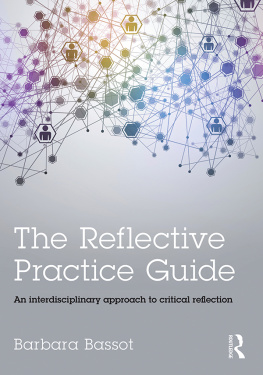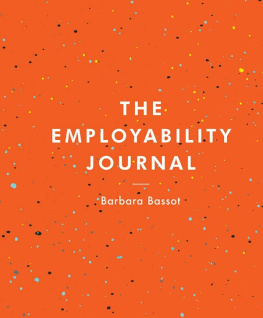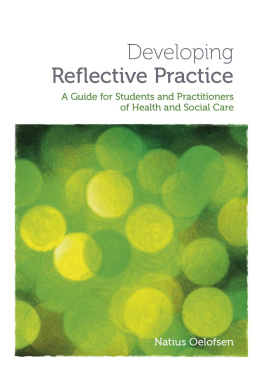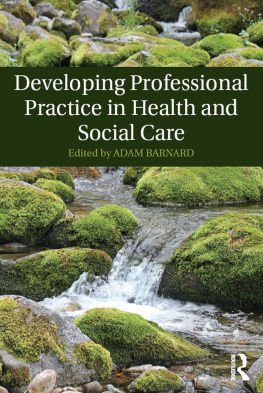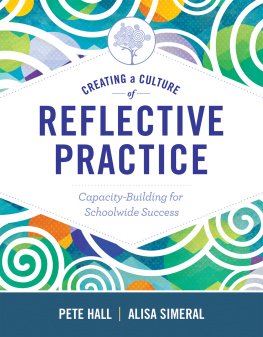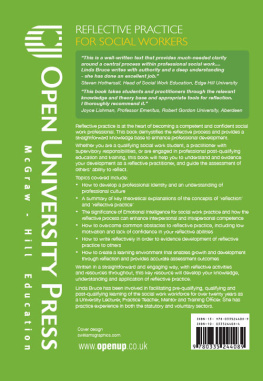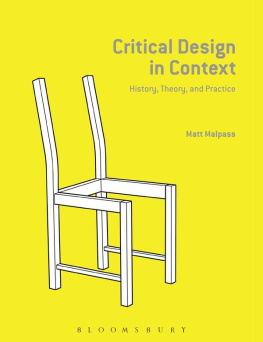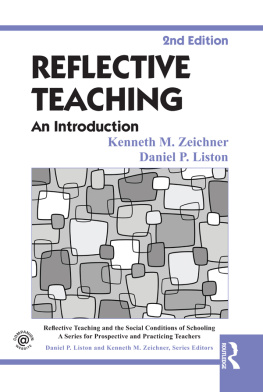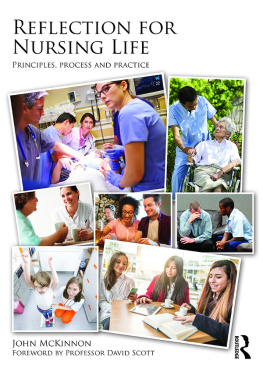
THE REFLECTIVE PRACTICE GUIDE
The Reflective Practice Guide supports all students for whom the process of reflecting on developing knowledge and skills is crucial to successful professional practice. It offers an accessible introduction to a wide range of theories and models that can help you engage more effectively in critical reflection. Illustrated throughout with examples and case studies drawn from a range of interdisciplinary professional contexts, The Reflective Practice Guide offers models of practice that can be applied in a variety of settings. Reflective questions in each chapter help you apply ideas to your own professional context.
Drawing on literature from a range of disciplines, key aspects of reflection explored include:
becoming more self-aware
the role of writing in reflection
learning from experience
learning from positives and negatives
emotions and processing feelings
bringing assumptions to the surface
learning from feedback
reflecting in groups
managing change.
The Reflective Practice Guide is an essential source of support, guidance and inspiration for all students on education, nursing, social work and counselling courses who want to think about practice at a deeper level, question approaches, challenge assumptions and gain greater self-awareness.
Barbara Bassot is Senior Lecturer at the Centre for Career and Personal Development, Canterbury Christ Church University, UK.

First published 2016
by Routledge
2 Park Square, Milton Park, Abingdon, Oxon OX14 4RN
and by Routledge
711 Third Avenue, New York, NY 10017
Routledge is an imprint of the Taylor & Francis Group, an informa business
2016 B. Bassot
The right of B. Bassot to be identified as author of this work has been asserted by her in accordance with sections 77 and 78 of the Copyright, Designs and Patents Act 1988.
All rights reserved. No part of this book may be reprinted or reproduced or utilised in any form or by any electronic, mechanical, or other means, now known or hereafter invented, including photocopying and recording, or in any information storage or retrieval system, without permission in writing from the publishers.
Trademark notice: Product or corporate names may be trademarks or registered trademarks, and are used only for identification and explanation without intent to infringe.
British Library Cataloguing in Publication Data
A catalogue record for this book is available from the British Library
Library of Congress Cataloging in Publication Data
Bassot, Barbara.
The reflective practice guide : an interdisciplinary approach to critical reflection / Barbara Bassot.
pages cm
Includes bibliographical references and index.
1. Nursing. I. Title.
RT41.B293 2016
610.73dc23
2015017531
ISBN: 978-1-138-78430-7 (hbk)
ISBN: 978-1-138-78431-4 (pbk)
ISBN: 978-1-315-76829-8 (ebk)
Typeset in Interstate
by Swales & Willis Ltd, Exeter, Devon, UK
For a number of years I have been privileged to teach a large number of students on programmes designed to prepare people for a role in the helping professions. My own professional area of career development and guidance is relatively small compared to others, such as nursing, teaching and social work. As a result, literature on reflective practice specifically related to my field was fairly sparse. In my early days of teaching I found that I had to look to a number of other academic disciplines and draw on their literature in order to ensure that my students were not hindered in the development of their knowledge and skills in this vital area. It became very clear to me that there was a wealth of rich material that we could learn from.
The Reflective Practice Guide is the culmination of many years of teaching. I wrote it in order to bring together a body of literature from a range of professions and have also included some work of my own. While books written for specific professions will always be very valuable, our knowledge will be limited if we never look outside of our own particular academic boundaries. I trust that this book will enrich your practice as you draw on the knowledge and experience of professionals and academics from a variety of disciplines, and that ultimately it will enable you to give your clients the support they need and deserve.
I would like to thank my family, friends and colleagues for their invaluable support whilst writing this book. In particular, I would like to thank Marc Bassot for his careful proof reading and Martin Bassot for his excellent work on the diagrams. I would also like to thank Mary Andall-Stanbury, Dawn Tickner, Jane Westergaard and Karen Williams for their advice on the case studies. Finally, I would like to thank all my current and former students, as without them I would not have been inspired to write this book.
is reproduced with kind permission from the Oxford Centre for Staff and Learning Development, Oxford Brookes University.
The important role of reflective practice is well recognised in a wide range of professional areas, including education, health, management and social care. If you are a student on a professional undergraduate or postgraduate programme, you will no doubt be asked to undertake a module (or more) on reflective practice, where you will be expected to engage in the process of reflecting on your developing knowledge and skills. As research has developed in this area, many people have come to realise that reflecting on experience alone is not enough. To take a genuinely reflective approach you need to be able to think about your emerging practice at a deeper level, questioning your approach, engaging with your feelings, questioning your assumptions and gaining greater self awareness. This is commonly referred to as critically reflective practice.
There are many books written on the subject of reflective practice. Typically, books are written within a particular academic discipline, e.g. education (in particular teaching), health (in particular nursing), and social work. Your tutors will undoubtedly recommend books written by those in their own discipline, and you should certainly follow their recommendations. However, there is much to be learned when the boundaries of academic disciplines are crossed. A recent ESRC project, Critical Reflection in the Professions examined how research can enable reflective practice to be taken further forward. One of the main aims of the project was to bring together academics from a number of different disciplines to discuss how critical reflection can be researched and taught more effectively, in particular across disciplines.
The aims of this book are twofold. First, it is the first book of its kind to take a specifically interdisciplinary approach, drawing on literature from a wide range of academic areas, including those mentioned above. Throughout the book, you will be introduced to a wide range of theories and models that can help you to engage in critical reflection on your studies and professional development. This will enable you to read outside your own particular academic discipline. For example, student teachers will be able to read extremely helpful approaches from nursing and vice versa; this will be new material for many. In addition, many professional practitioners now work in multi-professional contexts and an understanding of reflective practice from fields outside your own will also be very helpful.
Next page
